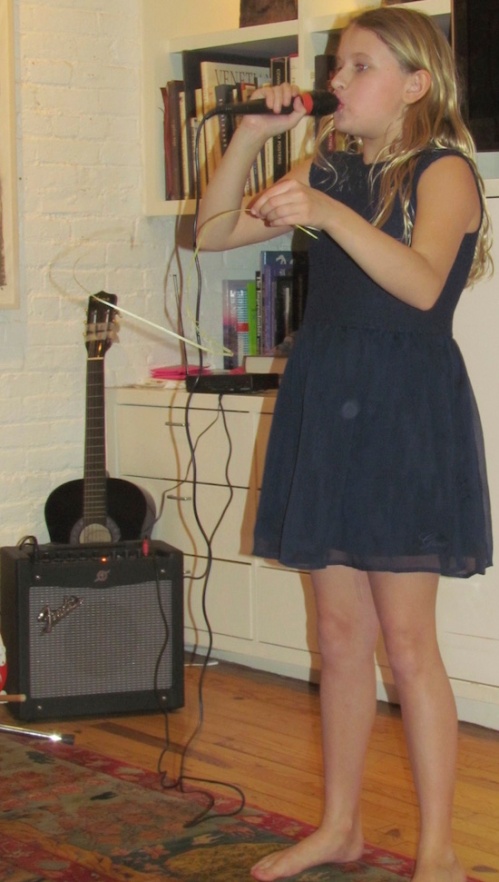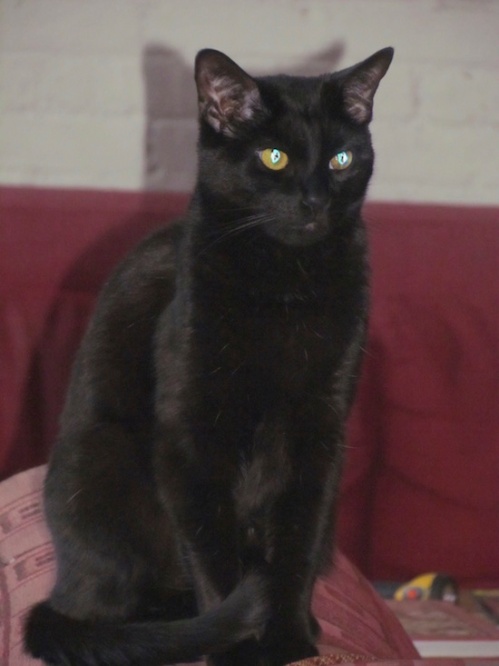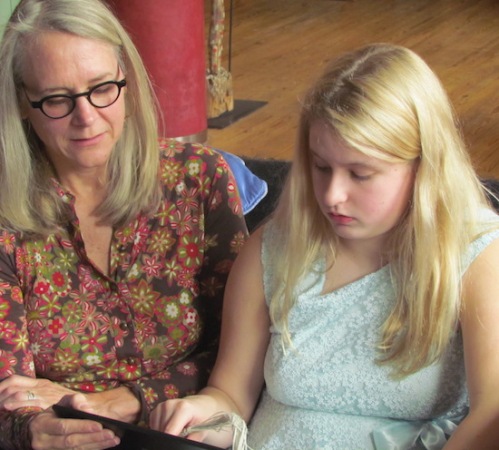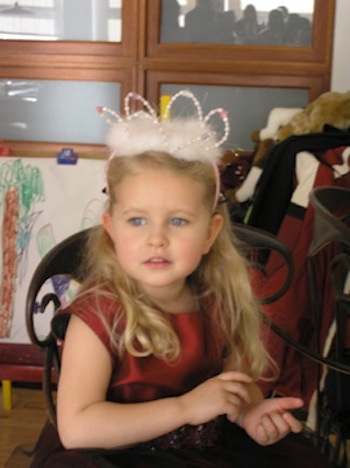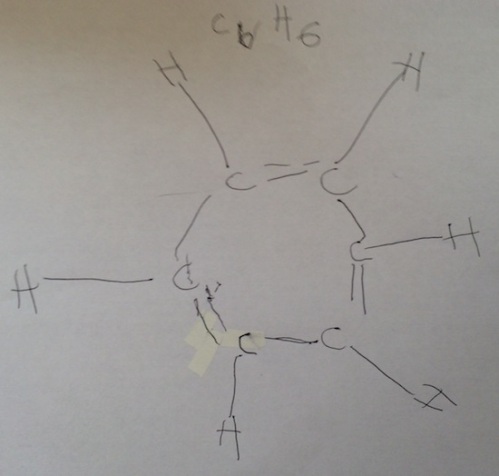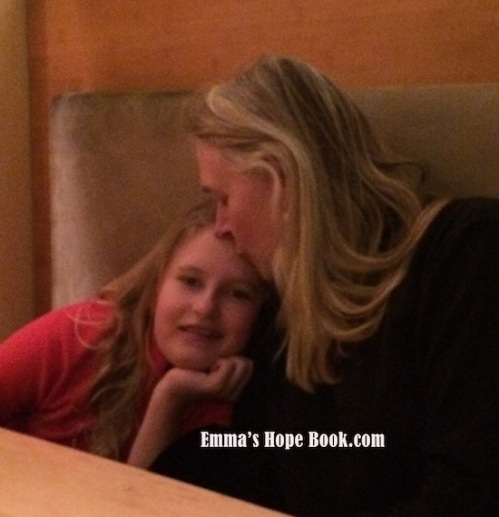One of the things I love about having a blog are the conversations I get to have with people I would not feel courageous enough to approach and/or get to know. Tracy Thresher is one of those people. Tracy Thresher and Larry Bissonnette are the stars of Wretches and Jabberers, the documentary by Oscar Award winning and two-time Academy award-nominated filmmaker Gerardine Wurtzburg. Wretches and Jabberers follows two non-speaking Autistic men, (Tracy and Larry) as they travel the world, reaching out to other non-speaking Autistic people in an attempt to change public perceptions surrounding intelligence and autism.
“Leading man, Tracy” as he often jokingly refers to himself, is a terrific public speaker. I have seen him speak through typing many times now and each and every time I am riveted. It isn’t just the poetic way Tracy puts words together, it is his humanity, his humor, generosity, and ultimately, his tremendous compassion for this world and the people who inhabit it, that makes people sit up and listen to every word he taps out one painstaking letter at a time.
The following is a dialogue Tracy and I have been having for about seven months now. It has taken so long because of our schedules, but also because I could not stop asking more questions. Every time Tracy answered one question, I would have about ten more. Tracy was not only patient with me, but his kindness infiltrates his every response. As this conversation could go on and on, as far as I’m concerned, I thought I better post what we’ve been discussing thus far.
AZ: Tracy, how would you describe the documentary, Wretches and Jabberers that stars you and Larry Bissonnette?
TT: Our film catapulted me to realize my dream of traveling the world to educate, learn and change old attitudes of discrimination toward people of varying abilities. The Larry and Tracy duo illustrates how intelligence is often worked out in a much different way. Our journey takes us to places of enlightenment and our humanity, humor and intelligence comes shining through our typing. Our mission to spread the reality of our amazing intelligence through our typing is our way of promoting the Presumption of Competence dispelling myths. Our story is one that is a road trip for two friends who are in Larry’s words “more like you than not”.
AZ: “More like you than not” is such a wonderful description. So much of the literature surrounding autism is about the “deficits” of Autistic neurology compared to non Autistic neurology. Can you talk about the assets and the similarities?
TT: In my way of thinking, my experience initially was uncontrollable anger for the life I had trying to break through the misunderstanding in school. Kids can be brutally honest, reflecting the language that was the accepted norm in my childhood. Labeling kids is crippling. MR (mental retardation) on a diagnostic chart equates to NOT a candidate for the honor roll. Now I am able to communicate the reality of autism. I met Monk Hogen during the filming of “Wretches and Jabberers”, shining his wisdom on my autism. My true desire and purpose in life is breaking the walls of injustice down and my autism is the gift God gave me. I now focus on how I am connecting with all kinds of people through my work on the road. The high I feel in my own community is so wonderful, knowing that people want to know me. The man I am today is because my autism is the gift I was given to be a leader to anyone who has ever felt less than human based on their appearance. Martin Luther King knew that hurt and he took it to the mountain of peace. My mind is more like a Mensa candidate than I can type. My life is a testimony to the lesson of humanity. Like Larry typed “More like you than not” is the guiding principle to inclusion.
The anger on stage during my presentation in Japan was related to the lost opportunities in my education. I kept shouting out my automatics like “Look at me now! The kid you told one another to keep in isolation now is mentoring students which is healing salve to old wounds of injustice.” The other anger in Sri Lanka is more about the heat in the way it took my overly heated mix of perspiration soaking my clothing to extreme discomfort. Also, the popular foods in their culture are not in my comfort zone. Finland washed my anger, turning my heart to love of the climate. The cuisine helped too. Primarily, beautiful lands of countryside put my spirit at ease. Henna melted years of lost hope by crumbling away the feelings of isolating my heart to love.
People in the world often fear the paradox that autism usually presents. Larry and I mostly felt gracious vibes in our travels but the camera crew likely alters reality. To reflect on the cultural attitudes, the typing of my international friends is the true compass pointing to injustice.
AZ: For children who may be trying to cope with similar frustrations and anger, what do you suggest to them and their parents, teachers and therapists?
TT: This is my mission to show kids and their supports that putting communication to the top of their list of priorities is vitally cleansing to the mind. Releasing deep thoughts is the key to alleviating anxiety. Frustration leads the body to unproductive anger. Being able to show intelligent thought is the path to happier futures and true quality of life, leading to purpose. That is what I sought and found with typing.
AZ: Was there anything others might have done to help when you were overwhelmed with anger?
TT: Harvey and I have trust in our partnership. I need his firm yet kind support to stay on course with managing my autism. Harvey and I work well together. Typing is my outlet and open communication is the key. Long term shared goals helps to keep me on track. Harvey’s commitment to my communication is the big time dosing of calm energy that I need. The commitment to presuming competence is the major breeze of refreshing air to cooling anger.
AZ: You communicate by typing, but need someone to support your typing. Why is it necessary to have someone physically supporting you?
TT: Impulse to type out my most irritating automatics like going to radio stations or wcax news gets looping in my mind. Having good facilitators is helping me to slow my typing to think and connect to my inner thoughts. I also need high goal of working on fading physical support to be more independent and type with lessening support. Building trust is critical to fading.
AZ: What issues and resources do you feel are most important for a parent to be aware of when encouraging their child to self-advocate?
TT: I look up to pioneers in the FC world like Annie McDonald for her courage in the looking with the harshest disbelief on her typing. Rosie Crossley I also find gave me hope with her tell-it-like-she- sees-it firm approach. On a daily basis, the man of firm guidance is Harvey Lavoy. Harvey is my guru of staying focused. I would say he is my mentor of communication.
AZ: When and how did you begin typing?
TT: I was one lucky man to meet Alan Kurtz in 1990. Alan was motivated to unlock my wisdom. He treated me to intelligent conversation. Alan picked up on my eyes grazing on morsels of typing in magazines and the local paper. I was one of the first people in my Green Mountains of Vermont to be treated to this life changing mode of communication. I was 23. Alan unlocked years of pent up chaotic thoughts. My intelligence was masked by autistic looping of hurtful labeling.
Early Supports:
I had my job coach Donna. Donna was kind and gentle. I liked her. Her support for typing limited me to Kinney’s work. It takes time to build foundations of trust and to build connections. Alan presumed my competence. The feeling of being spoken to in an intelligent manner was exhilarating. My inner thoughts hid in my mind looking for light like trees needing to flourish. My true communication jumping out on thin strips of paper was like first steps, shaky building of freeing my mind.
AZ: Did you know you could write, but had nothing you could write on or with?
TT: I could put letters together in my mind to make them join to form words. It was my life to play with vocabulary in lonely times. I did not think too much about how I could put my thoughts out on paper. The labeling I heard made for pesky lapping up of my hope for sharing my thoughts.
AZ: How hard was it to start typing?
TT: The torch of my fiery need to have a communication partner passed from Alan to Harvey Lavoy. Looking into my dark deep chaos was like unlocking madness. I held many hard grudges toward a label of retardation. The looping replay was non-stop with no way to talk or vent to Mom or a friend. Using miserable behavior is release of the locking in of intelligence. I had lots of my pre-scripted looping thoughts coming through my typing; things like radio and my local news station WCAX. My inner thoughts got masked in too much of holding on to my autism. I did not know the term proprioception then. Lack of knowledge of my own body ticked me off. My movement looked like no control in the beginning. Harvey had many arm wrestling contests with me. Ha-ha.
AZ: Was it frustrating?
TT: Oh big time ticked off was my typing in my starting out with Harvey. I had my liking of typing with my days with Alan. Mighty communication got put to the derailed track when Alan moved to Maine. Harvey took my brutal frustration in stride. I was brewing with lots of anger. I worried I would lose my life line of typing.
AZ: Did you immediately feel motivated and liberated?
TT: I did feel the tangled web of thoughts trying to be set free. My body was like a tight coil pulling so anxiously; did not easily break free to allow for liberation. Harvey motivated me by talking to me about self-advocacy. I began to hope life would be mine to choose. Emerging from despair is hard work. The power of typing took my mind to freeing the grip of autism but it took lots of grueling typing sessions.
AZ: Were you resistant to typing at first?
TT: My body took over my logical mind many times. I often ran from the typing space out to the parking space trying to regulate. It did not help to be gulping Mountain Dew. My impulsive habits with food led me to not think with clarity. I needed much support from Harvey to stay in my typing space.
AZ: If yes, did anything help with the resistance?
TT: Placing high expectations on me truly is my need. Harvey looked me in the eye to insist that I decide my purpose in life. To be in control I needed to make big changes in my life. I had terrible grating on Mom’s nerves yelling to be rid of. Holistic life of Buddhism is my goal but I easily revert to junk food at times. Harvey leads me to mindfulness by pointing out hard truths to help me make thoughtful choices.
AZ: What did it feel like to be able to communicate in a way that people seemed to finally understand? Was it at all scary?
TT: Typing lifted my label of retard. Scary, it was not. More like “Take that!” I had begun my journey to change perceptions. It was like the locking in of my voice was over. I was giddy with hope.
AZ: Lots of people who watched Wretches and Jabberers have asked about your living situation. Do you mind answering the question so many continue to ask – What is your living situation right now?
TT: My Mom and Dad live near my week day home provider. I have my Wednesday family dinners. My mom is very involved in my life. I made the choice to leave my parents’ home to embark on my journey toward having a life of my own. It has been arduous at times but I have learned hard lessons toward life of my own making. Right now I live in one place Monday through Friday. I spend weekends with my family or with my weekend provider. I am working with my team on finding a place of my own.
In addition Tracy sent me a word document which he said I could share with all of you:
Many people have tried to help with my residential situation. I would like to clarify my search is plagued with difficulties of lack of knowledge in the way I would like to be supported. My family is my greatest place of stability but my idea of independence is having my own home to hang my hat, to set up in the way I choose. Mom has been there my entire life to help me on my path to being the independent thinker I want to be.
It is my time to search for the place I want to live that is both independent oriented but gives me the right thinking type of support I need. By that I mean it is necessary for me to have physical cues to get my body moving not bossy final answers made by others. My dream is to be in my own place where I make choices of the groceries I wish to buy; the decorative theme is of my choosing; the communication is open; the weekends’ activities fill my desire for exercise.
The most important thing is the commitment to learning how to support my typing. I have to let it be known that my family would never turn me from their home; this is my desire in my search for being in control of my life that I want to make for myself. I know my fans mean well to help in my residential search. For me it is more than a hook to hang my hat on; it is being in peace in my way of living where I make the house rules in cooperation with my like minded roommate.
For more on this blog about Tracy and Larry click ‘here‘, ‘here‘, ‘here‘ and ‘here‘.
Tracy – 1991

Tracy at the ICI Conference – July 2013



